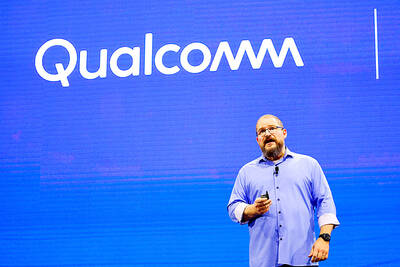Hedge funds have made their biggest bearish bet on the pound before UK data due this week that is to show the early effects of the nation’s decision to leave the EU.
The pound reached a one-month low yesterday ahead of reports on inflation, retail sales and unemployment benefit claims for last month, which would provide more detail on how the economy is faring after the June 23 referendum.
The pound had its worst day on record after the UK voted to leave the EU, while losses deepened this month following the Bank of England’s (BOE) decision to cut interest rates and boost its stimulus plan.
The pound fell to as low as US$1.2901 against the US dollar, a level unseen since July 11, before trading at US$1.2929 as of 6:51am in London yesterday, 0.1 percent higher than last week’s close.
It reached a three-decade low of US$1.2798 on July 6 in the wake of the referendum result.
The pound’s 12 percent slump this year makes it the worst performer among 31 major currencies against the US dollar.
“The pound has broken through some key psychological and technical support levels,” IG Ltd Melbourne-based market analyst Angus Nicholson said.
“If, as expected, we see further evidence of the UK heading into technical recession, it’s difficult to think of any scenario other than further BOE easing,” he added.
Hedge funds and other large speculators raised net bearish wagers on the pound to 90,082 contracts in the week to Tuesday last week, the most in Commodity Futures Trading Commission data since 1992.
The pound rose 0.1 percent to £0.8633 per euro from Friday, when it set a new post-Brexit low of £0.8653, a level unseen since August 2013.
While surveys since June 23 have shown contractions in construction, manufacturing and services, this week’s figures are to provide more concrete evidence of the vote’s impact on the UK’s economy.
The data are forecast by economists to show jobless claims increased last month while retail sales barely grew.
The BOE on Aug. 4 cut interest rates to a record low and restarted its quantitative easing program, spurring a 3 percent slide in the pound against the US dollar.
“The UK’s deteriorating economic outlook is reinforcing expectations of more BOE policy easing, which will continue to weigh on the pound,” Commonwealth Bank of Australia foreign-exchange strategist Elias Haddad wrote in a note to clients.
“Given the deterioration in business and consumer sentiment, UK retail sales risk underwhelming,” he added.

Intel Corp yesterday reinforced its determination to strengthen its partnerships with Taiwan’s ecosystem partners including original-electronic-manufacturing (OEM) companies such as Hon Hai Precision Industry Co (鴻海精密) and chipmaker United Microelectronics Corp (UMC, 聯電). “Tonight marks a new beginning. We renew our new partnership with Taiwan ecosystem,” Intel new chief executive officer Tan Lip-bu (陳立武) said at a dinner with representatives from the company’s local partners, celebrating the 40th anniversary of the US chip giant’s presence in Taiwan. Tan took the reins at Intel six weeks ago aiming to reform the chipmaker and revive its past glory. This is the first time Tan

Qualcomm Inc is strengthening its partnerships with Taiwan Semiconductor Manufacturing Co (TSMC, 台積電) and original design manufacturers (ODMs) in Taiwan as it expands its presence in the artificial intelligence (AI) computer market, CEO Cristiano Amon said in Taipei yesterday ahead of the annual Computex trade show. “Historically we’ve always been a very big customer of TSMC, and we continue to be,” Amon said during a media Q&A session. “For chip manufacturing, we’re among the largest fabless [semiconductor designers],” he said, noting that Qualcomm, a leading provider of mobile and AI-enabled chipsets, ships about 40 billion components every year, with TSMC being

‘FAILED EXPORT CONTROLS’: Jensen Huang said that Washington should maximize the speed of AI diffusion, because not doing so would give competitors an advantage Nvidia Corp cofounder and chief executive officer Jensen Huang (黃仁勳) yesterday criticized the US government’s restrictions on exports of artificial intelligence (AI) chips to China, saying that the policy was a failure and would only spur China to accelerate AI development. The export controls gave China the spirit, motivation and government support to accelerate AI development, Huang told reporters at the Computex trade show in Taipei. The competition in China is already intense, given its strong software capabilities, extensive technology ecosystems and work efficiency, he said. “All in all, the export controls were a failure. The facts would suggest it,” he said. “The US

NEW PRODUCTS: MediaTek has been diversifying its product lines to minimize operational risks as mobile chips remain the company’s biggest revenue source MediaTek Inc (聯發科), the world’s biggest supplier of smartphone chips, yesterday said the tape-out process for its first 2-nanometer chip would take place in September, paving the way for volume production of its most advanced chip, likely to be its next-generation flagship smartphone chip, around the year-end at the earliest. MediaTek has been leveraging advanced process technologies from its foundry partner, Taiwan Semiconductor Manufacturing Co (TSMC, 台積電), to build its flagship mobile phone chips, a segment it once relinquished and then recovered four years ago as it released its Dimensity series. In the semiconductor industry, a tape-out refers to the